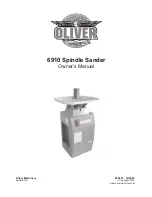
- 7 -
OPERATION & USE Cont.
NOTE:
Replace a damaged sanding pad immediately.
Never start the tool with the sanding pad loose or
unattached.
SANDING TIPS:
To achieve the best sanding results move the
sander in large orbits across the workpiece. To
avoid deep sanding do not tilt the sander
(Fig.7.).
ROUGH FINISH:
Applying only light pressure to the sander will
allow more surface removal for the workpiece.
FINE FINISH:
When more pressure is applied to the sander, the
sanding plate will rotate slower, but the random
orbit motion will remain the same. The finish will
be similar to an orbital sander.
NOTE:
The sander must be used for dry work only.
APPLICATION
Sanding damaged bodywork
Polyester fillers, rough finish
Sanding off old paint
Surface sanding on paint
Rough sanding fibreglass/Reinforced plastics
Sanding Natural finish woods
GRADE
80-120 grit
80-120 grit
40-80 grit
120 grit
40-80 grit
120grit
Fig.6.
Fig.7.
SELECTING THE RIGHT SANDING DISC:
Select the correct grade of sanding disc for the material being sanded and finish required (see the table
below as a guide).
Содержание 63124
Страница 11: ...10 NOTES...






























